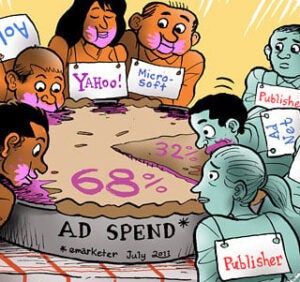 Here’s today’s AdExchanger.com news round-up… Want it by email? Sign-up here.
Here’s today’s AdExchanger.com news round-up… Want it by email? Sign-up here.
Telemetry Down
Ad fraud detection firm Telemetry appears to be shutting down, according to The Drum’s Ronan Shields. Telemetry was an early riser in the anti-fraud cottage industry, though AdExchanger sources say it struggled as the competitive field grew. The company is perhaps best known for a 2014 Financial Times article featuring withering analysis of a Mercedes-Benz campaign run by Rocket Fuel. According to the story, “Media agency sources had complained that Telemetry’s technology would frequently break down which would then result in it under-reporting campaign numbers, as opposed to the total number of ads served.” More.
Hold Your Horses
Borrell Associates recently pegged political digital ad spending in 2016 at about $1.4 billion [AdExchanger coverage], but that estimate has some people rolling their eyes. The reason: Much of the analysis comes from FEC reporting, which is transparent for TV buys but on the digital side “is absurdly loose about naming and categorizing vendors,” writes Audience Partners’ Jordan Lieberman in a column for Campaigns & Elections. For instance, the FEC lumps disparate online expenditures (like advertising, app maintenance and website design) into one ungainly category. Many companies raced into DC last year on the heels of billion-dollar spending projections, but the pickings were slim. “If you’re crafting your revenue plan based on grabbing some percentage of the Borrell Associates billion-and-a-half-dollar digital spend, you’re doing it wrong.”
A Shapeless Model
Display advertising will vanish by 2025, predicts Tom Standage, The Economist’s deputy editor and digital chief. Some hope online ads can supplant print revenue, but “this is a fantasy, and incumbent print publishers who try to move to a digital-ad model are mostly doomed to failure.” News outlets have more readers and interest than ever, but not through the formerly reliable circulation and advertising channels. Those twin highways have split into a corn maze where seemingly every blind path must be pursued to an uncertain end (think tablets, apps, native experiences, sponsored content, videos, conferences, reader contributions and all the other incremental boosters publishers are rooting for). “The new model is that there is no single model.” Check out an excerpt from a book released this month on post-print journalism at the Press Gazette.
Europe’s Heavy Hand
Europe has (once again) tightened regulatory oversight of the murky online media space. The Financial Times reports on a decision granting media companies the right to ban ad-blocking users. The change allows publishers to detect an ad blocker on a visitor’s device without being granted opt-in access to that device – formerly a legal gray area. More. Separately, a broadside directed at email and messaging services (primarily Google, Facebook and Microsoft) will require those parties to gain approval from users before directing ads based on message content.
Lunar Eclipse
Are the days of the Google moonshot behind us? The Information reports that Google Fiber, the would-be home broadband service, may be sold. And Google is in talks with a startup competitor, Planet Labs Inc., on the sale of its Skybox satellite business (which it bought for half a billion dollars in 2014). The items come after announcements in December that Alphabet will scale back Project Wing, an experimental drone delivery program, and spin its self-driving car initiative into a group called Waymo, which will partner with automakers instead of fulfilling early Google ambitions to build the car itself.
AdExchanger Daily
Get our editors’ roundup delivered to your inbox every weekday.
Daily Roundup
But Wait, There’s More!
- Our Continuing Commitment To Your Privacy With Windows 10 – Microsoft blog post
- Snap’s International Revenue Plan Breaks From Other Tech Leaders – WSJ
- In A Digital Media World, All That Matters Is Your Time – Recode
- Tech, Media And Telco Sector 2016 Deals Down 4.5% To $698.2 Billion – report
- Gravy Analytics In $7.7M Private Equity Raise – release
- Snapchat Tests Ecommerce And Lead Gen Ads – Adweek
- Debunking Myths Of Programmatic Delivery – Ad Age
- Gameloft Selects AerServ To Drive In-App Brand Advertising – press release
- Flipboard Chases Chinese Luxury Market – VentureBeat
- Research: B2B Customer Marketing On The Rise – press release
You’re Hired!
- DashBid Adds Jay Wardle As CRO – release













